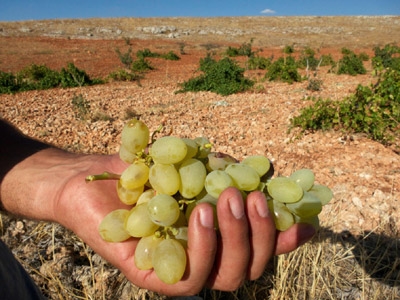Out of Eden Walk

He is like a hobo out of Steinbeck: resourceful and discreet. You never know what will spill from his rucksack after walking a long day. Plump little firebombs of peppers gathered in a farmer’s field. Bunches of sticky green grapes, pale with must, plucked from a vineyard. Fresh young zucchinis that snap when bent. Ripe tomatoes. Figs. Rarely have I caught my lanky guide in the act of liberating any of this tasty loot.
“Where did you get this?” I ask, startled. (After all, we have been walking together all day.)
Murat smiles his catlike smile. “Our culture,” he says, “permits travelers like us to take whatever we need.” The land is wide. It provides. With Murat, it is always Christmas.
Murat is a Kurd.
These are difficult times to be walking through his beautiful but wounded homeland in the mountains and valleys of eastern Turkey. The war in neighboring Syria, where ethnic Kurds are involved in combat, has rocked the entire region. It has upset a fragile détente between the Turkish government and its own Kurdish minority, who have been fighting a guerrilla war for greater autonomy for nearly 40 years. (More than 37,000 people, mostly Kurds, have been killed.) Kurdish hospitality is legendary. Often, we sleep in Kurdish homes, waited on like kings. Farmers and herders wave us under their mulberry trees, bidding us to sit, to rest our feet. They bring us cups of tea. They bring us cheese. But we are scruffy strangers—walking far from the main roads—driving a loaded mule. And so, there is sometimes suspicion too and mistrust, even rejection. We have been shooed away by frightened villagers. (One moment of comic opera: tossing my cell phone down like an unexploded bomb, and pirouetting with my hands up to demonstrate I am unarmed, when a unit of jittery, pro-government Kurdish militia ambushes us by mistake.)
Such tensions depress Murat. Like many Kurds he is a bruised idealist. He mourns, perpetually, for Kurdish unity. “We are stupid,” he mutters in his chiseled English, marching glumly ahead. “We sell ourselves cheap. For little money. Some guns. A little power.”
But then we make camp. And the rich treasures of the Anatolian earth come tumbling out of Murat’s upended bag. And soon he is joking. Telling stories. Turning potatoes in the hot ash of the campfire. At his Turkish boarding school, Kurdish children were punished for speaking their language. He remembers the food: chunks of old bread, jam and tea, day in and day out. To get it, he says, you had to grab faster than your classmates.
The two best meals I recall eating were in war zones. This is normal. In distress one clings to life, even by the taste buds.
Cowering under bombardment in a front-line village on the Shomali Plain, outside Kabul, a bearded Northern Alliance fighter once held out his fist: He wished to share his field rations with me. He opened his fingers and into my dirty hands deposited everything that was beautiful and good about Afghanistan: the piney woodiness of walnut halves, the high alpine sunlight distilled in golden raisins, the clean tang of snowmelt in purple mulberries. Chewed together, the taste was like an illumination round exploding inside my head. A year later in Iraq, near the burning city of Mosul, a Kurdish woman shared dollops of homemade yoghurt. It was April. Her yoghurt tasted of dew and of springtime pastures. It spread like a cool drug, like pure white light, from the lining of my mouth straight into my bloodstream.
In his 1930s story collection, “The Street of Crocodiles,” the Polish writer Bruno Schulz wrote:
On those luminous mornings Adela returned from the market, like Pomona emerging from the flames of day, spilling from her basket the colorful beauty of the sun–the shiny pink cherries full of juice under their transparent skins, the mysterious apricots in whose golden pulp lay the core of long afternoons. And next to that pure poetry of fruit, she unloaded sides of meat with their keyboard of ribs swollen with energy and strength, and seaweeds of vegetables like dead octopuses and squids–the raw material of meals with a yet undefined taste, the vegetative and terrestrial ingredients of dinner, exuding a wild and rustic smell.
Shulz, a Jew, was shot dead in his starving town by a Nazi officer. He was crossing a street. He died with a loaf of bread under his arm.
At night, I watch my friend Murat eat. His face is reddened by fire. With every bite of his foraged spoils, the bounty of his footloose harvesting, he is literally internalizing Kurdistan, his beloved idea of home. In this way, I realize, the entire planet becomes edible. And the walk, to use another writer’s words, is a moveable feast.
“What are you doing?” I ask Murat the next morning.
We are walking. Murat munches from a bag of wild food that the Kurds call güvij. It is the fruit of the hawthorne tree. He pops one of the little yellow pods into his mouth. Then he scatters two or three more alongside the trail on the long, chilly decent from Mount Karacadağ. He laughs. He tells me he is sowing a forest behind him.
Hot radish
Pierced my tongue,
While the autumn wind
Pierced my heart.
National Geographic













